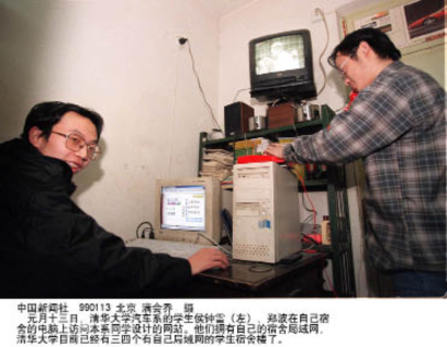Internet Is Changing Chinese Society
Expressing Public Opinion
Fang Xingdong established www.blogchina.com, China’s first blogging website, in August 2002. Because of its bold content, Ashes of Love by Mu Zimei drew so many readers that it crashed the server. From 2005 to 2009, Han Han, one of China’s most popular bloggers, became an online celebrity, although years later he was caught ghostwriting. Han commented on hot social issues with a rebellious attitude, making his blog popular among fans and gaining more than 100 million hits.
The prevalence of blogs in China is a significant milestone for the Chinese Internet. By the end of June 2009, China had 181 million blog users of whom 113 million were active bloggers. Most users were young people, with an increasing proportion in the white-collar class.
In face of hot social issues, bloggers are passionate about expressing personal opinions online. According to Xie Wen, former president of Yahoo! China, the biggest change from earlier systems is decentralization. Unlike top-down broadcasting, the exciting thing about social media is that everyone is a content producer and transmitter. This change has greatly broadened Chinese people’s means of expression. For the first time the public is able to comment and voice opinions about public events through the Internet. The year 2008 was called “China’s first year of network consensus.” By discussing current events like the Wenchuan Earthquake and Beijing Olympics, Chinese netizens were able to participate in the moulding of public opinion. The network consensus developed into a field investigation in 2009 after the Yunnan “hide-and-seek” incident. Invited by the Publicity Department of the CPC Yunnan Provincial Committee, netizens formed an investigation committee to conduct field surveys.
Microblogs made their spectacular world entrance in 2010. With the ability to broadcast instantly to large numbers of followers, microblogs have re-revolutionized the Internet.
According to The Report on Chinese Social Opinion and Crisis Management (2012), from 2003 to 2012, Internet development not only changed technology and media platforms, but also unconsciously transformed people’s ways to participate in public affairs.
“The Internet has prompted the construction of a democratic legislative system. The once-silent public has gradually participated in the discussion of politics. The change embodies an enhancement of civic awareness and power, and more importantly, the public’s responsibility to participate in public affairs,” said the report.
One positive result of this participation is that government sectors have widened the publication of governmental information. By the end of 2013, there were 258,737 microblog accounts for government affairs on the four portals (sina.com, tencent.com, people.com and xinhuanet.com), a growth of 46.42 percent over 2012. There were 75,505 microblog accounts of Party and government cadres, a growth of 19.22 percent over 2012. Moreover, the Internet has become a new bottom-up supervisory tool against corruption.
|
 |
|
On January 13, 1993, Hou Zhonglei (left) and his roommate Zheng Bo logged onto a website their classmates designed. Students had set up a local area network in their dormitory, which they accessed using a dialup connection. |
